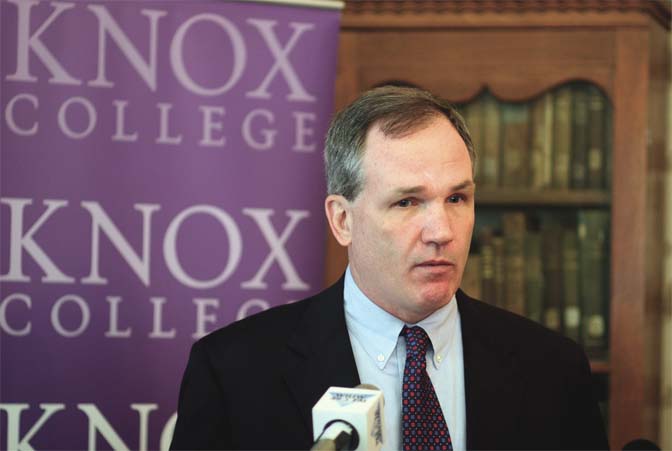Patrick Fitzgerald: Maximum
Prosecutor
by Norm Winick
The nation’s most famous
prosecutor
was in Galesburg Saturday to
deliver the
commencement address at Knox
College.
Patrick Fitzgerald’s
rain-shortened remarks
to the graduates centered on
the merits of
a career in public service —
and he’s made
his by sending other public
servants to
prison.
 Patrick Fitzgerald is first and
foremost
an attorney — and one who takes
the law
very seriously. Meeting with a
few reporters
afterwards, Fitzgerald refused
to answer
many of the questions which
were related,
if even tangentially, to
pending cases. The
Patrick Fitzgerald is first and
foremost
an attorney — and one who takes
the law
very seriously. Meeting with a
few reporters
afterwards, Fitzgerald refused
to answer
many of the questions which
were related,
if even tangentially, to
pending cases. The
main one of interest is that of
former Illinois
Governor Rod Blagojevich. Even
a question
about what it felt like to be
on national
television announcing the
arrest and the
allegations against G-Rod was
deemed off limits.
He did say that he wasn’t a “TV
guy”
and hadn’t seen Patti
Blagojevich on “I’m A
Celebrity: Get Me Out of Here.”
He also would not proffer an
opinion on
the potential pardon of former
Governor
eorge Ryan. He defended former
Governor
Jim Thompson’s right, as an
attorney, to
request one, and acknowledged
that he has
expressed his views on the
matter to the
Justice Department but wouldn’t
disclose
what they are.
He also would not compare the
corruption
in Illinois to that in other
locales. “There are
93 U.S. Attorneys and I don’t
want to make
any comparisons among us.”
When asked whether the laws on
the
books give him all the
ammunition he
needs to do his job, he said
that “I am not
in a position to advocate for
legislation. For
the most part, I think we have
the laws we
need.”
One of those laws that he
enthusiastically
supports is the PATRIOT Act. He
summarily
dismissed any concerns about
civil liberties
and described some of the
problems he
had gathering evidence when he
was
prosecuting alleged Al-Qaeda
terrorists in
New York. “Before the PATRIOT
Act, there was
a wall, an impenetrable wall,
between the
different
intelligence-gathering agencies.
There were perceived
differences in the
rules for gathering evidence in
criminal
investigations and in terrorist
or national
security cases. Because of
that, agencies
would not share information
with each
other. When I was investigating
terrorist
activity, I could talk to and
get information
from the CIA and even Al Qaeda
itself but not
the FBI. It’s like you’re
playing on a football
team but they won’t let you in
the huddle.
What the PATRIOT Act did was
allow all the
information that was legally
gathered to be
shared among all the agencies
involved. It
tore down that wall. I think if
people actually
read the act and saw how much
it helps us
prosecute and how little new
there was
that actually impacted their
freedoms, there
would be much greater support
for it.”
There was another speaker at
Knox
College on Saturday —
graduating senior
Sean Bullock. His talk included
a humorous
look at his “decision” to
attend Knox College:
“Like most people here, at some
point I
received a bit of mail from
Knox College. I
had never heard of Knox, had no
desire to
go to Illinois, and frankly
wasn’t a huge fan of
purple; however, my loving
mother insisted
that I apply. I would have
refused, but the
common application made it so
there was
no additional work to get my
mom off my
back.
After applying to Knox, I
received a phone
call from a student here. I’ll
never forget:
I asked her with great concern,
“What is
there to do in Galesburg?”
There was a long
pause and she reluctantly
replied, “Well,
we have a Target and a Walmart.” With
that encouragement, in the fall
my family
and I made the drive from
Chesterfield, Va.
to Galesburg, Ill. I have since
seen many
beautiful parts of Galesburg;
however, the
exit from I-74 onto Main St. is
not one of
them. With that as my image of
Knox, I was
already homesick. I missed
mountains, the
beach, anything that wasn’t
flat and windy.
I couldn’t have known then how
much I
would truly enjoy my time here…”
Transcripts of both addresses
are available
on the Knox College website at
www.knox.edu.
6/11/09
 Patrick Fitzgerald is first and
foremost
Patrick Fitzgerald is first and
foremost